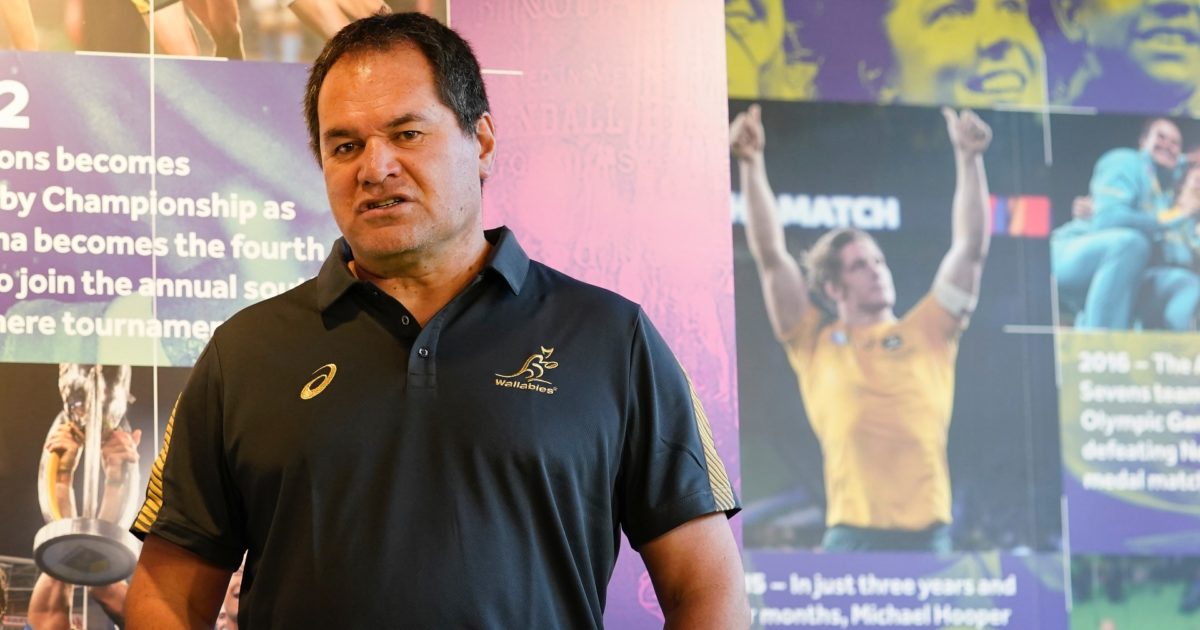'Cheika put the Wallabies back 10 years' - Dave Rennie's first game in charge gives Wallaby fans a new perspective on the Cheika-era

A new-look Wallabies side have held the All Blacks to a famous 16-all draw in Wellington, and very well could’ve won the test had a 54 metre Reece Hodge penalty not have drifted as far to the right.
In the first test of the post-Michael Cheika-era, the Wallabies started the contest with passion and purpose, looking the more threatening until Jordie Barrett broke the deadlock with a try arguably against the flow of the match.
There appears to be a fresh approach to how Australia tackle the game, with coach Dave Rennie letting his players play to their strengths, and familiar combinations. By doing so, he was able to get the most out of them in the first Bledisloe Cup fixture.
Debutants Harry Wilson and Filipo Daugunu were looking lethal down the right edge especially early on. Daugunu crossed for Australia’s second try with just under 20 minutes to go, in what was overall a world-class debut from the Queensland Reds winger.
The winger was once of a number of players who really stood up when the going got tough. In the frantic period of stoppage time that followed the full-time siren, every player was putting their body on the line and competing in a way that’s been lost to Australian rugby for some time – and didn’t their fans love it?
Even though Australia didn’t win the test, the performance recaptured the passion and intrigue of the rugby public Down Under, like we haven’t seen in decades. In his one match in charge, Dave Rennie has seemingly won over the Australian rugby fans, who completely believe that he can get the most out of this golden generation of up-and-coming talent.
Rennie’s approach both on and off the field put the spotlight on just how far Cheika’s regime had been out of touch, with one fan calling himself a ‘fool’ for being a Cheika defender. Another lamented how long Rugby Australia kept the former coach in the job, with ‘pride now restored’ in the national team.
Cheika put the Wallabies back 10 years, and now he's at the Roosters surprise surprise they're having their mad monday tomorrow
— Karthik Rajesh (@karts95) October 11, 2020
Wallabies getting pay from kicking game in Test fashion post-Cheika #Bledisloe #NZvAUS
— Jim Tucker (@HulaBulaJim) October 11, 2020
https://twitter.com/moose287/status/1315145479982809088
https://twitter.com/RydOrDi33/status/1315165990527746048
Not a bad game so far! Very early days and score makes it look less close then it is but I think the attack already looks better than it did under Cheika #BledisloeCup
— Ask Janet (@Movie_Pleb_meg) October 11, 2020
What a bloody game!!!! I say it again…”CHEIKA COULD NEVERRRRR” #BledisloeCup #NZLvAUS
— Steph ?? (@coconutsheila) October 11, 2020
Massive wind behind them can only help the Wallabies. So much better than the side Cheika picked. #NZLvAUS
— alunsays (@alunsays) October 11, 2020
What a game from the Wallabies!
The Cheika era is over. Pride has been restored in our national team.
— Mal C (@Mal47C) October 11, 2020
Danger-men for the Wallabies ??Tupou and Kiwi Dave Rennie – you can already see that Oz are not wobbly like they were under Cheika
— Kisset.C (@kyrosrugby) October 11, 2020
As awful as NZ we’re, that was Impressive from #Australia, should have got Cheika out the picture ages ago #BledisloeCup
— James Kennedy (@kendolphexpress) October 11, 2020
Definite improvement in the Wallabies play since the Cheika strategy of doing the same thing over and over unsuccessfully, but its probably too soon for the full results of the change
— Steve (@littlesteve) October 11, 2020
Got really crazy in ~5 minutes of extra time
Brilliant !
ADVERTISEMENTScrappy but fun
AB’s looked a little rusty but Wallabies showed potential that was sadly lacking under Cheika
It’s been a funny year
— Irish Freedom UBI next (@IrishBitch9) October 11, 2020
Remember when Cheika took over as coach and beat the ABs in Game 1 with the Pooper? Don’t let this be that again! #NZvAUS
— Matt Griffiths (@mattagriffiths) October 11, 2020
This is the best Wallabies performance since, well when Cheika took over. #mrangry #NZLvAUS
— alunsays (@alunsays) October 11, 2020
Reversing the Cheika effect.
— MollymookMick (@ainsliegrotto) October 11, 2020
Rennie influence was immense. Our basics were leagues ahead of where we have been under the Cheika years. Discipline was much better, ball handling and carrying skills were very impressive. Honestly can’t remember the last time I saw a wallaby performance like this
— Jonathan (@JonMickie17) October 11, 2020
After the match, the two teams gathered in the sheds for what can only be described as a rugby moment. Two teams who’d just belted and bruised each other for 90 minutes of test rugby, met to celebrate Michael Hooper, who at 28 became the youngest player ever to reach 100-caps.
The moment was captured on the Wallabies Twitter page, and their fans sang the praises of Rennie once again, and the change to culture and the approach the rivalry that is already in effect.
Michael Cheika halted the tradition going right back to men who served as ANZACs together of the @wallabies & the @AllBlacks having a drink together after a Test match. Pleased that Dave Rennie has restored the tradition. ?? https://t.co/ByVvUaoUB9
— Stephen Clark (@ClarkHistoryPol) October 11, 2020
A long overdue return to mutual respect and goodwill. Great to see.
— Rob Smith (@RobertSmithIX) October 11, 2020
This is why I love rugby.
— premfrey (@premfrey) October 11, 2020
Rennie added following the match that the Wallabies are still not where they want to be, and aren’t satisfied with the draw.
The teams will go head-to-head again next Sunday at Eden Park in Auckland, before the Wallabies host two Bledisloe Cup matches of their own across the Tasman in Australia.










































































